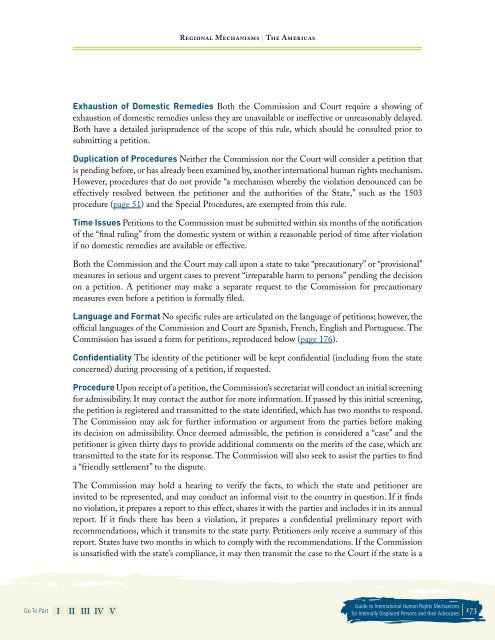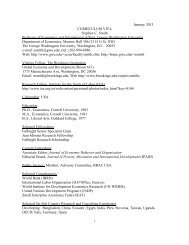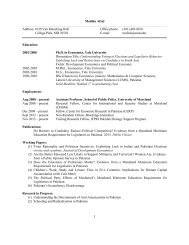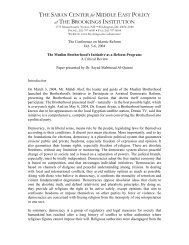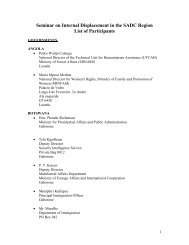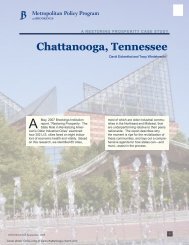Guide to International Human Rights Mechanisms - Brookings
Guide to International Human Rights Mechanisms - Brookings
Guide to International Human Rights Mechanisms - Brookings
Create successful ePaper yourself
Turn your PDF publications into a flip-book with our unique Google optimized e-Paper software.
Go To Part I II III IV V<br />
Regional <strong>Mechanisms</strong> | The Americas<br />
exhaustion of Domestic remedies Both the Commission and Court require a showing of<br />
exhaustion of domestic remedies unless they are unavailable or ineffective or unreasonably delayed.<br />
Both have a detailed jurisprudence of the scope of this rule, which should be consulted prior <strong>to</strong><br />
submitting a petition.<br />
Duplication of Procedures Neither the Commission nor the Court will consider a petition that<br />
is pending before, or has already been examined by, another international human rights mechanism.<br />
However, procedures that do not provide “a mechanism whereby the violation denounced can be<br />
effectively resolved between the petitioner and the authorities of the State,” such as the 1503<br />
procedure (page 51) and the Special Procedures, are exempted from this rule.<br />
Time issues Petitions <strong>to</strong> the Commission must be submitted within six months of the notification<br />
of the “final ruling” from the domestic system or within a reasonable period of time after violation<br />
if no domestic remedies are available or effective.<br />
Both the Commission and the Court may call upon a state <strong>to</strong> take “precautionary” or “provisional”<br />
measures in serious and urgent cases <strong>to</strong> prevent “irreparable harm <strong>to</strong> persons” pending the decision<br />
on a petition. A petitioner may make a separate request <strong>to</strong> the Commission for precautionary<br />
measures even before a petition is formally filed.<br />
language and format No specific rules are articulated on the language of petitions; however, the<br />
official languages of the Commission and Court are Spanish, French, English and Portuguese. The<br />
Commission has issued a form for petitions, reproduced below (page 176).<br />
confidentiality The identity of the petitioner will be kept confidential (including from the state<br />
concerned) during processing of a petition, if requested.<br />
Procedure Upon receipt of a petition, the Commission’s secretariat will conduct an initial screening<br />
for admissibility. It may contact the author for more information. If passed by this initial screening,<br />
the petition is registered and transmitted <strong>to</strong> the state identified, which has two months <strong>to</strong> respond.<br />
The Commission may ask for further information or argument from the parties before making<br />
its decision on admissibility. Once deemed admissible, the petition is considered a “case” and the<br />
petitioner is given thirty days <strong>to</strong> provide additional comments on the merits of the case, which are<br />
transmitted <strong>to</strong> the state for its response. The Commission will also seek <strong>to</strong> assist the parties <strong>to</strong> find<br />
a “friendly settlement” <strong>to</strong> the dispute.<br />
The Commission may hold a hearing <strong>to</strong> verify the facts, <strong>to</strong> which the state and petitioner are<br />
invited <strong>to</strong> be represented, and may conduct an informal visit <strong>to</strong> the country in question. If it finds<br />
no violation, it prepares a report <strong>to</strong> this effect, shares it with the parties and includes it in its annual<br />
report. If it finds there has been a violation, it prepares a confidential preliminary report with<br />
recommendations, which it transmits <strong>to</strong> the state party. Petitioners only receive a summary of this<br />
report. States have two months in which <strong>to</strong> comply with the recommendations. If the Commission<br />
is unsatisfied with the state’s compliance, it may then transmit the case <strong>to</strong> the Court if the state is a<br />
<strong>Guide</strong> <strong>to</strong> <strong>International</strong> <strong>Human</strong> <strong>Rights</strong> <strong>Mechanisms</strong><br />
for Internally Displaced Persons and their Advocates 1


